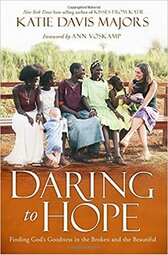Mission trips to Rwanda have made me interested in east Africa. For that reason, I was excited to read Katie Davis Majors’ Daring to Hope: Finding God’s Goodness in the Broken and the Beautiful.

In Daring to Hope, Katie shares stories from her life and ministry in Uganda that emphasize God’s goodness during those times in her life when God didn’t act the way she wanted God to. Throughout Daring to Hope, Katie continually wrestles with the question, “What do you do when God doesn’t show up in the way that you asked Him to?”
As she wrestles with her answer to this question, Katie tells stories that often appear hopeless. More often than not, they involve death and despair. In Katie's words, “I unknowingly believed that when things turned out well, God’s blessing was evident. And so I kept asking and waiting for the beauty to be revealed on my terms.”
When God doesn’t behave how Katie begs him to, she concludes, “This reality left me with two choices: either God is not actually who He says He is or He is and I needed to relearn how to know Him even in hardship.”
As Katie shares stories of brokenness, she weaves them together with various Scripture passages including Jacob wrestling with God, God providing a ram for Abraham when he’s asked to sacrifice Isaac, and the book of Habakkuk. As Katie wrestles with these scriptures, she learns, “A faith that trusts Him only when the ending is good is a fickle faith. A faith that trusts Him regardless of the outcome is real.”
Some of the most powerful stories Katie shares in Daring to Hope are those that involve her in someone else’s healing. In her words, “Jesus was to bring about my own healing by drawing me into someone else’s.”
As Katie walks with others, she realizes, “Maybe we are not called to alleviate suffering (as I had once imagined) as much as we are called to enter into the suffering of others and walk with them through it. We mourn with those who mourn, we weep with those who weep, we cry out with them for something better.” Katie goes on to explain, “The most powerful thing we can do for another person is not to try to fix his or her pain or make it go away but to acknowledge it. I cannot heal… But I can be a witness.”
Overall, despite how much I love memoir, I found Daring to Hope to be a slow read, perhaps because I never read Katie’s Kisses from Katie. As a result, I was unfamiliar with the earlier parts of Katie's story and therefore not as invested in her journey as other people might be. That said, those who are already familiar with Katie’s story will surely enjoy Daring to Hope, as will those who are currently experiencing difficult times. To them, Katie’s story will inspire.
****************************************************
Disclosure: I received a free copy of Daring to Hope from Blogging for Books in exchange for a fair and honest review.